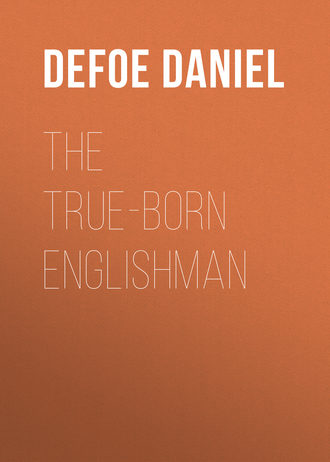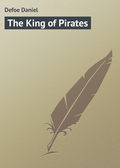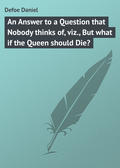
Даниэль Дефо
The True-Born Englishman
XXXVII
ROBINSON AS A TEACHER
(From Robinson's Diary)
"I began to consider that having now two mouths to feed instead of one, I must provide more ground for my harvest and plant a larger quantity of corn than I used to plant. So I marked out a larger piece of land and began to fence it in. Friday worked not only very willingly but very hard. I told him that it was for corn to make more bread because he was now with me. He let me know that he was grateful for my kindness and would work much harder if I would tell him what to do.
"This was the pleasantest year of all the life I led in this place. Friday began to talk pretty well and understood the names of almost all the things that I called for and of all the places which I wished to send him. I was careful to teach him all the things I knew. I showed him how to plant and harvest corn, how to gather fibre, spin yarn and to weave it into cloth. He learned these things quickly and became very skillful in making pots. He knew something about this because at home he had seen the women make them. He ornamented them with figures of birds and flowers. I taught him about the true God. But as for writing he could never do much with this. I had no books and could not make him understand the importance of writing. He began to talk a great deal to me. This delighted me very much. I began to love him exceedingly. He was so very honest and faithful.
"After I had taught him English I tried one day to find out whether he had any wish to return to his own country and as I talked to him about it I saw his face light up with joy and his eye sparkle. From this I had no doubt but that Friday would like to be in his own country again. This for a time made me sad, to think how eagerly he would leave me to be among his savage friends. 'Do you not wish you were back in your own country, Friday?' I said to him one day. 'Yes,' he said, 'I be much O glad to be back in my country.' 'What would you do there,' said I? 'Would you turn wild again and do as the savages do?' He shook his head and said very gravely, 'No, no, Friday tell them to live good. He tell them to plant corn and live like white mans.'
"One day when we were on the top of a hill on the west side of the island, Friday suddenly began to jump and dance about in great glee. I asked him what the matter was. 'O, joy, O glad,' he said; 'there my country!' The air was so clear that from this place, as I had before discovered, land could be distinctly seen looking westward.
"I asked him how far it was from our island to his country and whether their canoes were ever lost in coming and going. He said that there was no danger. No canoes were ever wrecked and that it was easy to get back and forth. I asked him many things about his people and country. He told me that away to the west of his country there lived 'white mans like you.' I thought these must be the people of Central America, and asked him how I might come from this island and get among these white men. He made me understand that I must have a large boat as big as two canoes.
"I resolved at once to begin to make a boat large enough for us to pass over to the land we could see lying to the west and if possible to go on to the white man's country Friday told me about. It took us nearly two months to make our boat and rig her out with sails, masts, rudder, and anchor. We had to weave our sails and twist our rope. We burned out the canoe from a large fallen log. We used a great stone tied securely to the end of a strong rope for an anchor.
"When we had the boat in the water, Friday showed great skill in rowing or paddling it.
"He had managed boats ever since he was old enough, but he did not know how to handle a sail or rudder. He learned very quickly, however, to sail and steer the boat and soon was perfectly at home in it.
"We made our boat safe by keeping it in the little cove at the mouth of the creek. I had Friday to fetch rocks and build a dock or place for landing. But the rainy season was now coming on and we must wait for fair weather. In the meantime I planned to lay by such quantities of food as we would need to take along."
XXXVIII
ANOTHER SHIPWRECK
One evening Robinson sat in his shelter thinking of his plans to escape to Friday's country. He was sad. For, after all, this place was very dear to him. It was the only home he had. Had he not made everything with his own hands? It was doubly dear to him on this account. He thought how it would grieve him to leave his goats, his fields, and the many comforts he had here.
He had been telling Friday of his home in New York. He told him of the great city, and of its many wonderful sights. He told him of his country and people, of his flag and its history. All these things brought back memories of his boyhood and he wondered what changes had come in his long absence. Friday, with wonderful intelligence, listened to all Robinson told him. He was delighted in hearing Robinson tell of the wonders of the great world, for he had never known anything about it. As they talked Robinson noticed the approach of a storm. The sky was getting black with clouds. The winds were blowing a hurricane. The waves were coming in mountain high. It reminded him of the eventful night now twenty-five years ago when his ship was tossed up on the shore like an egg shell and broken to pieces.
Suddenly there was a sound that made Robinson start from his seat with the wildest alarm. Was it the sound of a cannon from the ocean or the terrible crash and roar of the water on the rocks of the coast? There it is again; it is a cannon! Some ship is in distress! This is its signal! Robinson ran out and down to the shore with Friday at his heels.
"O master!" said Friday, "can we not help? If they only knew the island was here and how to steer into the harbor beyond the point of land on the south."
Robinson was so excited that he scarcely knew what he was doing. He ran up and down the shore calling wildly, but the awful roar of the sea and wind drowned his cries. Suddenly his thoughts came to him. "Quick, Friday, get some fire in a pot. We will run to the point, gather grass and wood, and make a fire there. Maybe we can guide them into the harbor."
They soon had a great beacon light sending its welcome greeting far over the sea. The pilot of the ship saw it and steered his ship nearer and nearer. Robinson was ready to shout for joy as the ship seemed about to make the harbor. The ship had her sails torn in shreds and her rudder broken. It was hard to steer her in such a gale. On rounding the point, she was blown on the rocks. With a frightful crash which could be heard above the din of the storm she struck and held fast. Robinson could hear the cries of the men and the orders of the officers. They were trying to get boats ready to put off, but such was the confusion of the storm and the enormous waves breaking over the deck that it could not be done quickly. Before the men could get a boat into the sea, and get into it, the ship gave a lurch to one side as though about to sink. All the men jumped for one boat. It was overburdened. The wind tossed it about. The sea soon filled it and it went down and all were lost.
Robinson and Friday remained on the shore all night. They watched to see if they could not help some poor sailor that might cling to a plank and be blown on shore. They saw no one.
At last they lay down, but they could not sleep. Many times they sprang up and ran about for fear that some poor fellow would need their help. At last morning came. The storm ceased. Robinson and Friday searched everywhere for the bodies of the sailors, but could find none. But the wind had blown the ship in plain view, and into shallow waters. It was lying on the bottom with more than half its bulk out of the water. The masts were gone. It was a sad sight. No human being could be seen on it.
They were now rejoiced that they had their boat ready. "Let us take it," said Robinson "and go out to the ship. It may be some person is still on the unfortunate ship." They were soon by the ship's side. They rowed around it until they saw a rope hanging down from the deck. Robinson seized this and clambered up. Friday tied the boat fast, and followed. Robinson opened the door leading from the deck into the ship and went down. He searched in all the cabins, and knocked at all the doors. He called, but all was still. When he was satisfied that every person on board had been drowned he wept bitterly.
Friday stood there with open and staring eyes. He looked and looked. He was astonished at the large ship and at the wonderful things before him. They were in the cabin where the passengers had been. There stood trunks under the benches and clothes hung on the hooks on the wall. One trunk was open. In it were telescopes through which the travelers had looked at the land. Robinson saw also paper, pens, pen-holders and ink. Books were also near by. Robinson first took a thick book. It was the Bible, out of which his mother had so often taught him. Then they came to the sailors' cabin. There hung muskets and swords and bags of shot and cartridges. Then they went to the work-room. There were saws, hammers, spades, shovels, chisels, nails, bottles, and pails, knives and forks. And something more, over which Robinson was most glad, matches. At last they came into the store-room. There lay bags of flour and barley, teas, lentils, beans and sugar. Then Robinson embraced Friday in his great joy and said to him, "How rich we are!"
XXXIX
SAVING THINGS FROM THE SHIP
After Robinson had looked through the ship he began to plan the way to get the tools and things he most wanted on shore. He and Friday first carried everything together that he wanted to take on shore. When they had done this, he found he had the following things. Robinson stood everything together that he needed most.
1. A case of nails and screws.
2. Two iron axes and several hatchets.
3. A saw.
4. A small case of planes, tongs, augers, files, chisels, etc.
5. A third case with iron brackets, hooks, hinges, etc.
6. A case of matches.
7. A barrel of gunpowder.
8. Two muskets and a pistol.
9. Several swords.
10. A bag of cartridges.
11. A large sail cloth and some rope.
12. A telescope.
By means of the ship's ropes, Robinson let everything down into his boat. He himself took the Bible and then they rowed to the shore, and unloaded the boat. Everything was put into the bower where rain could not harm it. By the time they had this done, night was coming on and they decided to do no more that day, but wait until the next day.
"We must work fast," said Robinson. "The first storm is likely to break the ship in pieces and destroy everything in it."
The next morning early they ate a hastily prepared breakfast and were off to the boat. Neither Robinson nor Friday stopped for their noonday lunch. "A storm is brewing," said Robinson, "the air is calm, the sky is overcast with clouds, the heat is oppressive. We must hurry." With the utmost diligence they rowed back and forth all day. They made nine trips. They had now on shore a surprising quantity of all kinds of tools, goods and weapons. They had all kinds of ware to use in the kitchen, clothes, and food. Robinson prized a little four-wheeled wagon and a whetstone.
But in looking over his stores, Robinson suddenly discovered that he had no needles or thread. They went at once to procure these important articles. In looking for needles and thread, Robinson found a small trunk full of money and valuable stones. There were diamonds, rubies, pearls, and much gold. Robinson pushed it to one side. "What can I do with riches on this island? I would give them all for some needles and thread," he said to Friday. But on second thought he took the trunk and its contents along with him to his cave. For in the trunk were also letters and writings. "Perhaps," he said, "these tell to whom the valuables belong and I can return them some time."
Robinson at last found a case containing everything one could need with which to cut and sew cloth. There were scissors, thread, needles, thimbles, tapes, and buttons. But now the wind was rising and they must hurry. They were nearly ready for departure. They were passing through a part of the ship not before visited. They were surprised to hear a sound coming from a room whose door was kept shut by a heap of stuff that had been thrown against it by the violent pitching of the ship in the storm. Robinson and Friday cleared away the rubbish and were surprised to find a dog almost drowned. He was so weak from want of food that his cries could be heard a short distance only. Robinson took him tenderly in his arms and carried him to the boat, while Friday carried the sewing case and the trunk.
The wind was now blowing a gale. A few yards from the ship they were in great danger. Robinson grasped the rudder and made Friday stand ready to cut away the mast in case they found the wind too strong. With the greatest difficulty they finally made the little cove at the mouth of the creek and were soon landed with their precious cargo. The next morning they eagerly searched the waters for the ship. Not even their field glasses could reveal anything of it. Some planks, a mast, and parts of a small boat were blown on shore. All else had disappeared.
Robinson set to work at once to make a door for his bower out of the pine wood cast up by the waves. How easy the work proceeded with saws, hammers, augers, squares, planes, nails, hinges, and screws! With the wagon too, Friday could now gather his corn quickly and easily, or haul in a great quantity of grapes to dry for raisins.
Friday had never seen a gun. He did not know the use of firearms. The muskets that Robinson had brought from the ship were a great mystery to him. Robinson showed him their use. He showed how they could defend themselves. He told Friday that these weapons would kill at a distance. He took some powder and touched a match to it. Friday was greatly frightened.
Robinson then proceeded to load the gun. He put in some powder, a ball of lead or bullet. Then at the hammer he placed a little cap which gave a flash when struck. This ignited the powder. When all was in readiness Robinson bade Friday follow him. They went slowly out into the forest along the stream. Soon Robinson espied a rabbit sitting under a clump of grass. Robinson raised his gun, took careful aim, pressed the trigger. There was a flash and loud report and there lay the rabbit dead. But Friday, too, was lying on the ground. He had fainted from astonishment and fright. Robinson dropped his gun and raised the poor fellow up to a sitting position. He quickly recovered. He ran to get the rabbit. He examined it carefully. Robinson at last pointed out the hole the bullet had made and the mystery of the way the rabbit was killed was solved.
Robinson had lived alone so long that he had learned to love every living creature on the island. He never harmed anything except when he needed food. He had lived so quietly that the birds and animals did not fear him. They lived near his shelter and seemed to know him.
Robinson was delighted with his new tools and weapons. But they reminded him of home. Nothing that he had seen in all the time he had been on the island so turned his thoughts toward home and friends. Robinson would sit for hours thinking of the past and making plans for the future. He was homesick.
XL
THE RETURN OF THE SAVAGES
Robinson now renewed his plans for escaping from the island to Friday's country. They first rebuilt their boat with their new tools. They hollowed out the center till the sides were thin toward the top. They shaped her sides and keel. They made her prow sharp so that she would cut the water easily. They made a new mast, strong and tall and shapely. They made larger and stronger sails and ropes. They made two pairs of extra oars. They made boxes and cupboards in the prow and stern for keeping their fresh water and provisions. Friday's eyes sparkled with joy when it was done. He hoped he would now be able to return to his own island and parents. Robinson noticed his joy and asked him, "Do you want to return to your own people?"
"Yes," said Friday, "very much."
"Would you trust yourself in this boat?"
"Yes," said Friday.
"Very well," said his master, "you may have it and start home when you please.". "Yes, Master, but you come too, my people will not hurt you." Robinson resolved to venture over to Friday's land with him.
But before their preparations were complete the rainy season of our fall set in. They resolved to wait until the weather was settled and as soon as the rainy season was over to set out. They ran their boat well up into the creek and covered it over with a large tarpaulin made of sail-cloth obtained from the ship.
Robinson had now been on the island twenty-seven years. For the last three years he had lived happily with his companion Friday. Every year in September, Robinson celebrated the day his life was saved and he was thrown up on the island. Robinson celebrated it this year with more than the usual thankfulness. He thought that it would be his last anniversary on the island.
One morning, Friday had gone to the beach to find a turtle. Soon he came running back out of breath. "O Master," he cried, "they are coming, they are coming to take me prisoner!" He was trembling with fright.
"We must take our guns and defend ourselves," said Robinson. "But we will not kill anyone unless they attack us." This quieted Friday. They loaded four muskets and three pistols. Robinson put the pistols in his belt, where he also fastened a sword. He gave Friday a pistol and a musket, for Friday had learned to shoot well. Besides Friday carried a bag of powder and bullets. Robinson took his field glasses and saw twenty-one savages with two prisoners. The prisoners were bound and lying on the ground. This was a war party celebrating a victory with a feast. They probably intended to kill their prisoners. "We must save the lives of those men," said Robinson.
The savages this time had landed quite near Robinson's shelter, not more than a half mile below the creek's mouth. Soon he and Friday started off. Robinson commanded Friday to follow quietly and not to speak or shoot.
"We will surprise them and give them a good scare," said Robinson.
When yet a considerable distance away they could hear the savages yelling and screaming. Some of them were dancing their war dance. Their faces and bodies were painted to make them look terrible to their enemies. They were dancing around their prisoners with hideous cries and gestures. They could now see the prisoners plainly. One had a beard and was plainly a white man. Robinson was surprised and determined to save him at all risks.
"Get your gun ready to fire," he said to Friday, "and when I say the word let us run forward yelling and firing our guns over their heads. This will fill them with such fright that they will take to their heels and boats and get away as soon as possible. In the scramble and confusion we will rush in and rescue the prisoners."
This plan did not please Friday at all. His savage blood was up and he wanted to kill all he could. "Let's fire on them," he said. "Let's kill all but the prisoners."
"No, no," said Robinson, "it's always wrong to take life unless it cannot be avoided to save one's own. Let's try my plan first."
With great reluctance Friday consented. At a signal from Robinson they rushed forward, and when in plain sight they fired off their muskets in the air. If the ground had suddenly exploded beneath their feet there could have been no more confusion, astonishment, and fright. A few took to their heels. Others lay as if dead. They had swooned from fright. But as Robinson came up they jumped to their feet and pushed into the boats, leaving the prisoners behind. Robinson and Friday still rushed forward and fired their remaining loaded guns and pistols in the air. The savages made all haste to get into their boats and push off. Soon they were well out to sea, paddling rapidly for the west. Robinson reloaded his arms and gave them a farewell volley, but not a soul was killed or even wounded. This gave Robinson great pleasure. He had accomplished his purpose without bloodshed.
They could now turn to the prisoners. Robinson ran back to them and quickly cut their ropes. Robinson asked the white man who he was, but the man was too weak to answer. Robinson gave him a piece of bread.
The fear of death being removed, the white man soon grew stronger. When Friday came running back from watching the boats and saw the savage that had been a prisoner he gave a loud yell. He threw his arms around the man, kissed him and laughed and cried for joy. He put his head on his breast and hugged him again and again. Robinson was greatly surprised and puzzled. He asked Friday what his actions meant. But so intent was Friday that he got no answer.
At last Friday recovered far enough from his great joy to say with face beaming with delight, "O, Master, this man is my dear father." They at once began a long conversation, each one told his story. Suddenly Friday jumped up and said, "How foolish I am, I have not thought to give my father anything to eat and drink. He must be nearly starved." And away he ran toward the shelter and was soon back with food and water to drink.
Robinson learned through Friday from his father that the white man was a Spaniard, that he had been captured by the tribe that had a battle with Friday's people. The Spaniard was one of sixteen men that had been saved by Friday's people from a wrecked ship. So weak were the prisoners that they could not walk to the shelter. Robinson and Friday made a litter and carried them one after the other. When once there, Friday prepared some rich rice soup. The prisoners ate heartily and in a few days were strong enough to go about the island.







